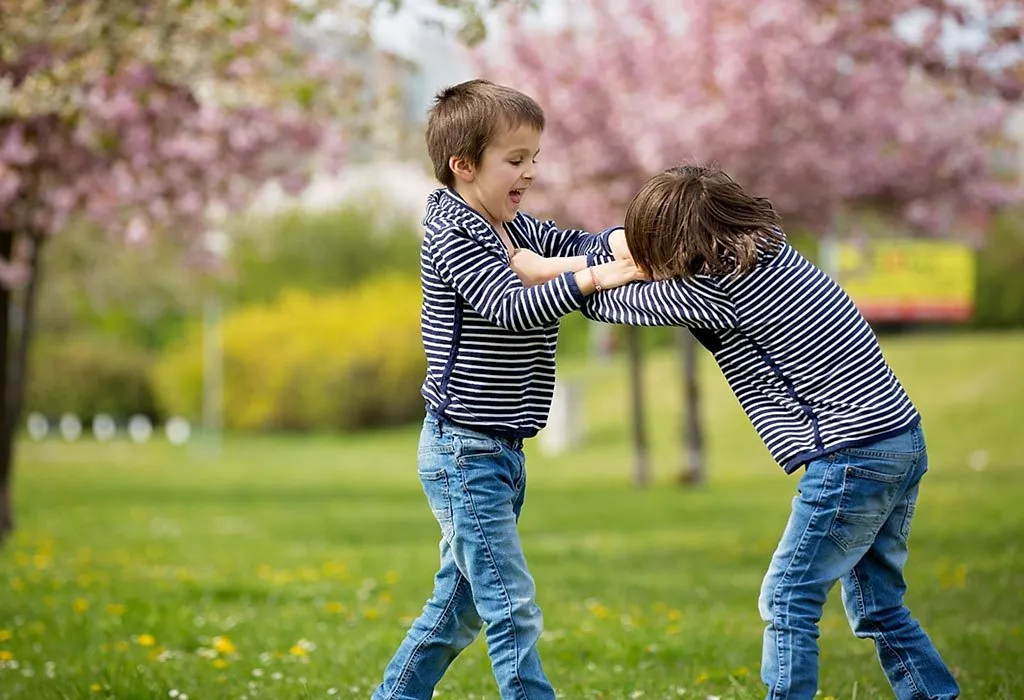Dealing with Fighting Between Twins
- Why Do Twins Fight?
- How to Handle Rivalry and Fighting Between Twins
If you found it hard to handle your twins when they were born, maybe you weren’t yet thinking about their preschool years! As your twins will grow, you may start to get tired of running after them. Managing twins is a challenging task, and this challenge multiplies when they fight with each other all the time. If you do not take action on time, their fights will get worse with time.
Just like all other siblings, twins fight, too, and quite often. These fights begin when they are toddlers; they fight for small issues like being pushed or not sharing a favorite toy to play with, etc. Their mode of fighting could be different, such as hitting, biting, pulling each other’s hair, scratching each other’s arms, and crying. This phase of fighting is completely normal, and is a part of their growing up, when they learn to negotiate with each other. This phase of twin sibling rivalry helps them to explore and form their own identity, and will pass as time goes by.

How to Handle Rivalry and Fighting Between Twins
Although twin rivalry isn’t a huge worry initially, parents should be able to handle it and ensure that it does not affect their relationship in any manner. The following tested and proven techniques will help you manage their fights, and regain peace in the house:
Whenever you see a fight in progress, it is instinct to instantly jump in between to discipline your twins. To be fair to them, give them the chance to speak. First, assign the role of a perpetrator to one kid, while the other one becomes the victim. Later, reverse the roles. In this way, both the children will get the chance to speak from their point of view, and then you can decide. When you are handling twins, it is important to be fair to them. Favoring one child always will make the other one feel bad, and his bad behavior may aggravate. Hence, it is important to acknowledge them and to help them realize their mistake.
2. Be consistent.
Inconsistency with rules, like making rules one day and breaking them the next day, is often the cause of sibling rivalry. So, it is your responsibility to ensure that rules are followed by your twins. Explain to them why their behavior isn’t right. Being inconsistent with rules will confuse them, and they won’t understand the difference between right and wrong. Also, make sure that the rules are the same for both children.
3. Step out of the home.
One of the best ways to deal with fights between twins (or all children, for that matter) is to get out of the home. If you are worried that this will expose the fights to the outside world, bear it for a while. Once you get out and step into a new environment, it will calm them, and do wonders for their bad moods. Maybe they have stayed indoors for too long, and need to burn off that excess energy. Simply taking a walk in the neighborhood, or moving to a different room, can make a difference.
4. Keep them apart for a while.
Twins tend to study and play together, whether in playschool or with their common friends. Home is no different, and thus they spend the better part of the day getting on each other’s nerves. If you have tried everything to no end, then you should try to keep them apart. If one is outside for a while, the other child will have no one to fight with, and hence there will be a peaceful environment in your home. Also, as the old proverb goes, “Distance makes the heart grow fonder”, separating them may make them miss each other, and you never know, they may stop fighting.
If you want to stop your twins from fighting, don’t raise your voice. If you shout or yell at them, they may imitate you to get on your nerves. So, try the other way. Take a few deep breaths, or listen to some music. Get out of the room in which they are fighting, and let them figure out how to solve the problem on their own. Maintain your calm; you will become a role model for your kids, and they will learn to manage their feelings and emotions by observing you.

6. Give individual attention.
A potent method of preventing a majority of disagreements and fights is to give the twins equal and individual attention. You can spend time solving a puzzle or reading a book together. Do anything that equates to “special time” for them. One-on-one time is always recommended to make them feel loved as an individual, which improves their relationship as twins.
7. Negotiate.
Try to create a win-win situation for your twins in every activity that they choose to do together. This can work wonders in maintaining peace between them for a large part of the day. Allow one to choose which game to play first, but then he has to agree to play the game next selected by the other twin. Encourage them to take turns with everything they do, and guide them gently towards a winning conclusion.
8. Warn them.
As parents, it is your responsibility to teach your twins to solve the conflicts on their own. Most twins will want to play together, which is bound to lead to a conflict at some point. Warn them that if you have to intervene the next time, they will have to spend an hour playing or doing things on their own. This changes their behavior, and reduces fights.
At a very young age, children rarely understand the effect of their actions on another, like biting and shoving. Make a sad face and say, “Oh! That really hurt.” when one of them shoves or bites the other. Push the child’s arm gently against his teeth to show that biting hurts a lot, or mimic the action with your mouth.
10. Eliminate triggers.
Look for things that could trigger a nasty fight between the two. As parents, you will be aware of the toys, games, or books that could act as potential triggers, so ensure they are never left alone with them. Twins also tend to fight when they are tired, so stick around when you think that’s about to happen. This makes life easier for all.
